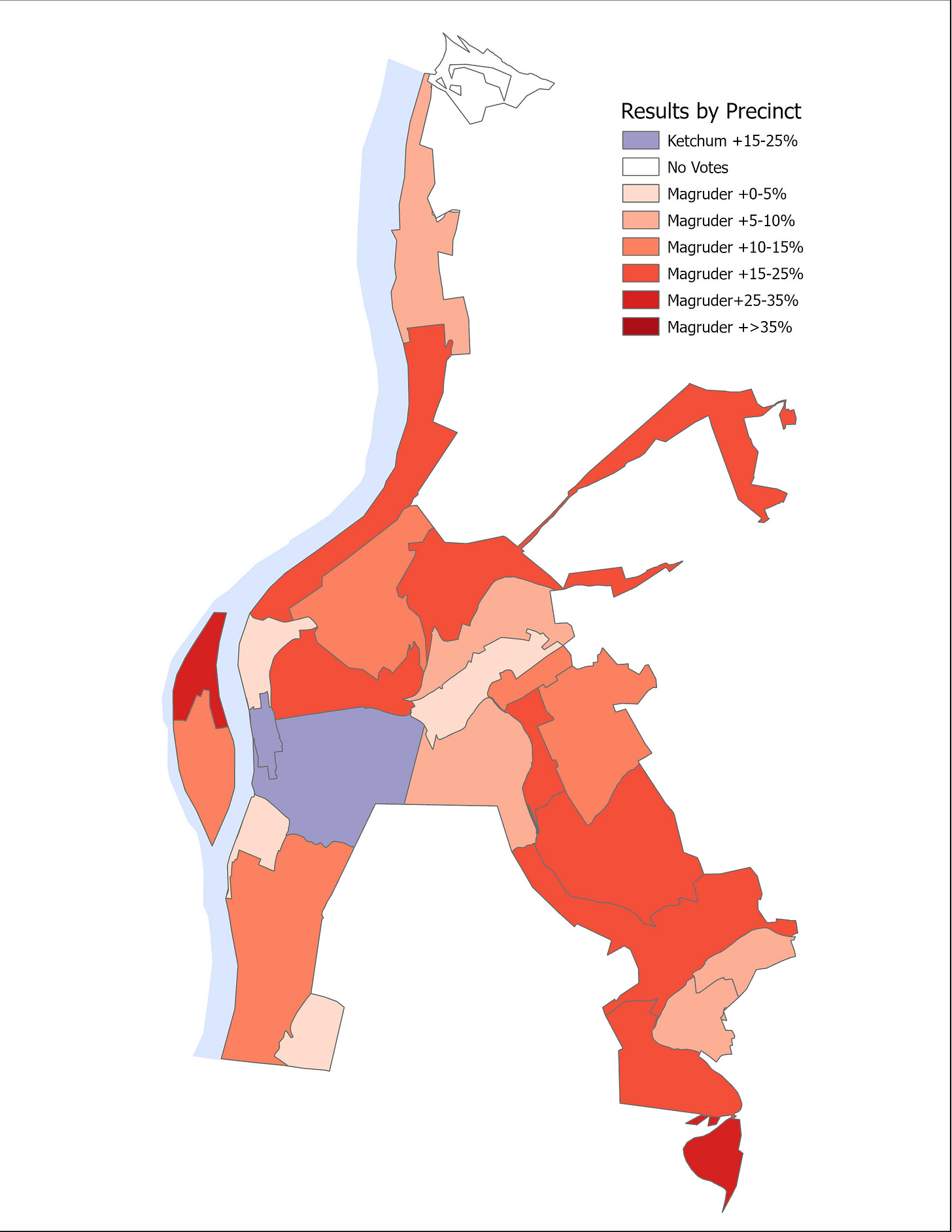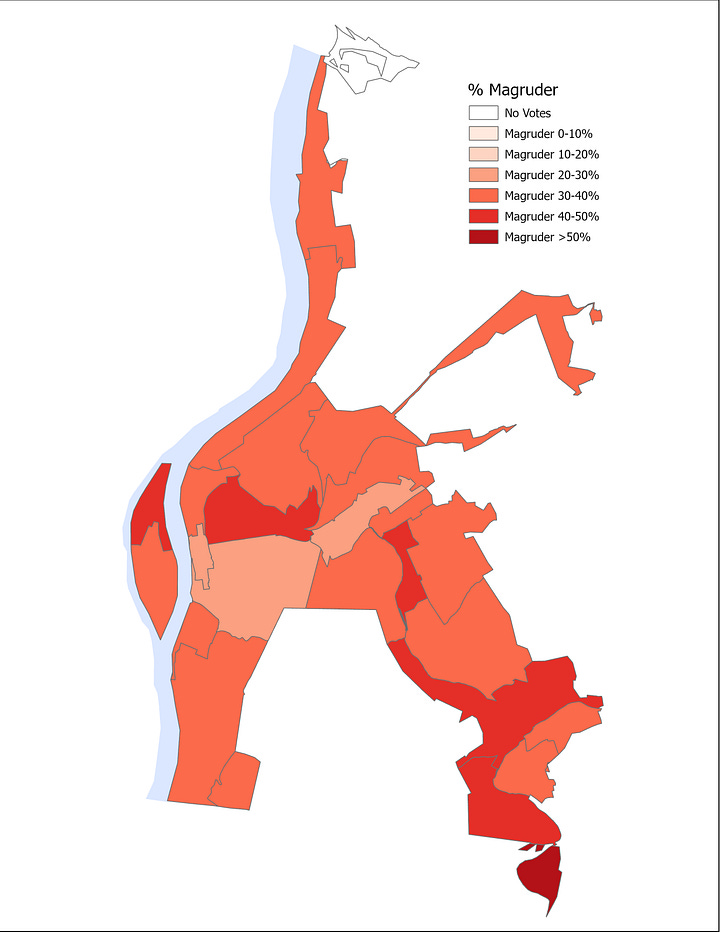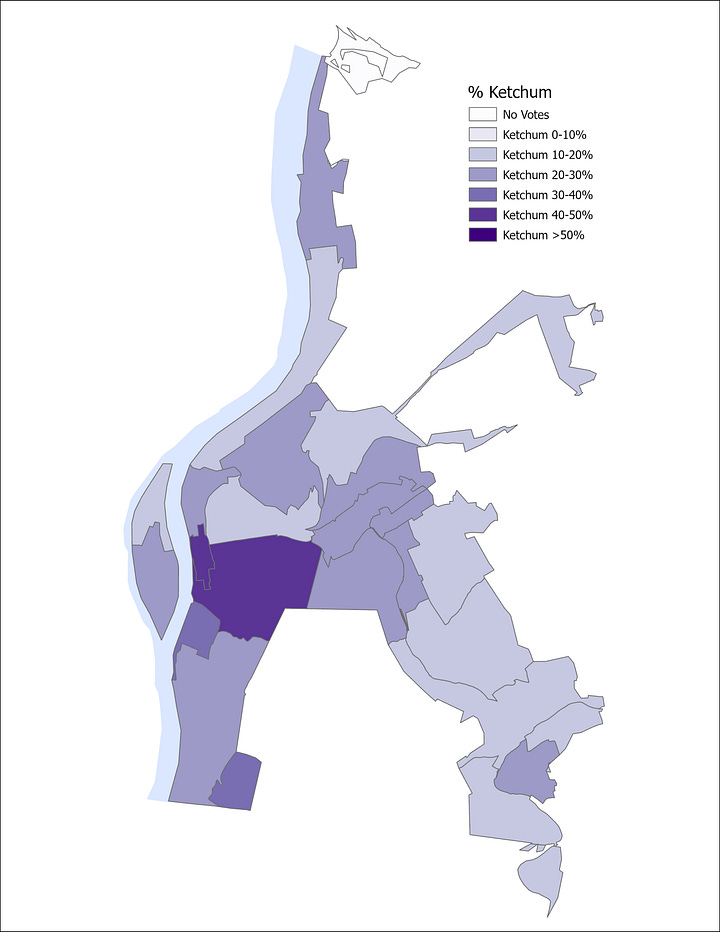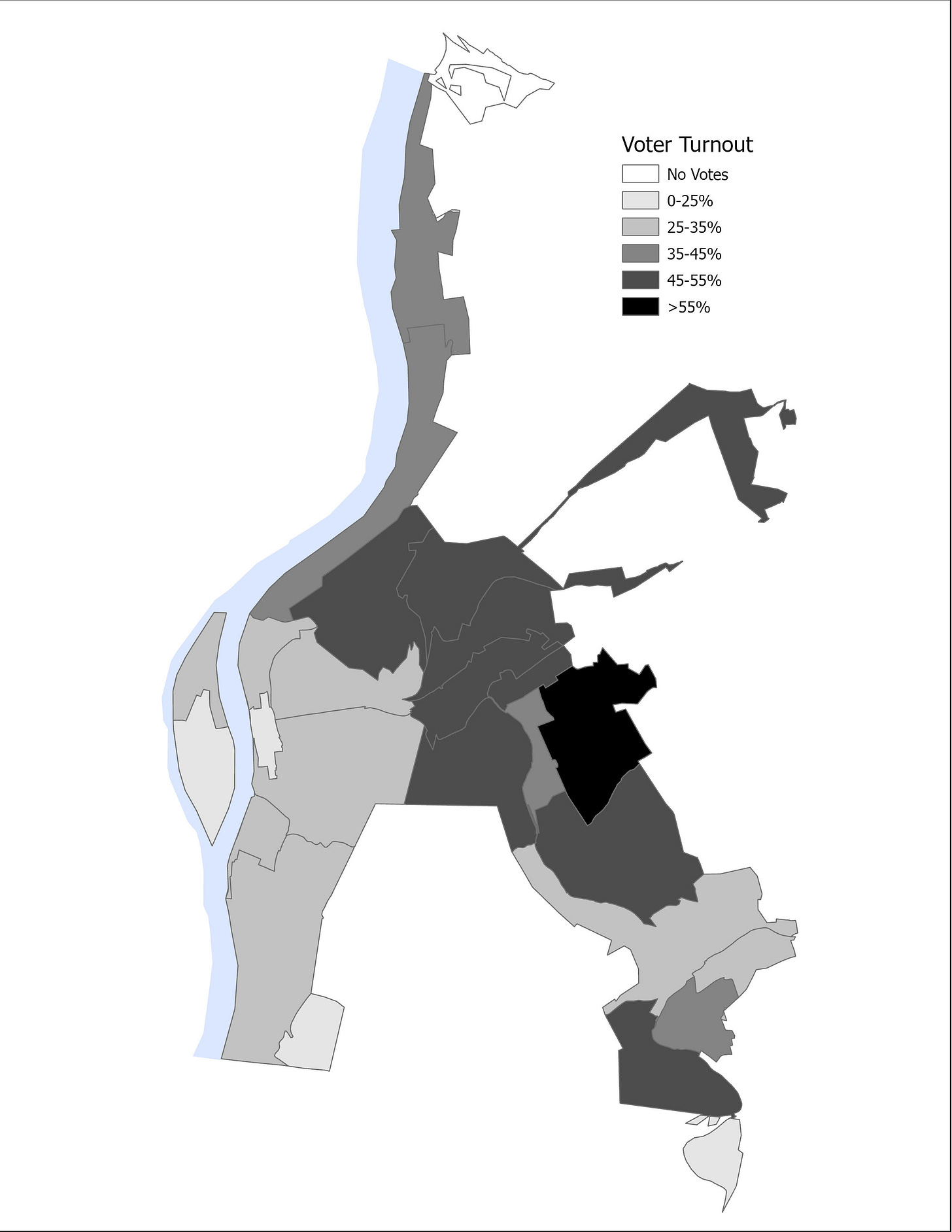Community Corner: New maps detail Wheeling’s 2024 mayoral election
One year after voters elected Denny Magruder their mayor, new maps detailing candidate support and voter turnout show signs of why the results were so divided.
On May 14, 2024, Wheeling voters elected their first new mayor since 2016. The six-way race saw three progressives, two conservatives and one centrist vie for the city’s legislator-in-chief: Carl Carpenter, Rosemary Ketchum, Chad Thalman, Denny Magruder, Beth Hinebaugh and JT Thomas.
Wheeling’s city elections are nonpartisan and utilize the first-past-the-post, or plurality, voting system. No primaries and no runoffs. Whoever receives the most votes, wins. And, with six candidates in the race, this one-off election was predestined to be a highly-divided race.
How Wheeling voted…
Denny Magruder was victorious, but he garnered just 37% of the total vote—likely the lowest share of votes in any Wheeling mayoral election. His roughly 2,700 votes won were 1,000 votes less than then-incumbent Glenn Elliott received in 2016—hardly a landslide by any measure.

As a candidate, Magruder rode the coattails of an electorate seemingly tired of social issues and struggling with rising prices and inflation. At a forum featuring mayoral candidates, Magruder said safety and infrastructure would be his top priorities. He went on to say he didn’t want Wheeling to become a “sanctuary city” and that the CROWN Act—legislation designed to ban discrimination related to protective hairstyles—“isn’t a good thing.”
Although Magruder later walked back his comments about the CROWN Act, it’s clear Magruder tapped in to a more conservative-leaning spotlight as compared to the race's second-highest vote-getter, Rosemary Ketchum.
Ketchum did not explicitly run as a progressive—just as Magruder didn’t explicitly run as a conservative—but her support for more liberal policies was not unknown to voters, including her stances on homelessness and urban planning. She also would have been the first transgender person elected mayor anywhere in the state of West Virginia, lending most voters to assume her political leanings.
She received just over 1,000 votes less than Magruder, achieving the support of 23% of the electorate. Combining Ketchum and Magruder’s vote totals, though, shows over 60% of voters supported either of their campaigns—a likely sign of a politically divided, and uncertain, city.


Magruder carried 22 of the 24 voting precincts in the city, but didn’t crack percentages higher than 44%. He saw broad support in the city’s suburban—and more affluent—neighborhoods of Edgwood, Park View, Oakmont and Woodsdale, as well as Elm Grove and the northern-portion of Wheeling Island.
Ketchum carried the other two precincts—Downtown and East Wheeling. In each, she only reached 40% with Magruder coming in second place. The urban-core precincts are Democratic strongholds, being some of the few precincts in Wheeling to vote for the Democratic candidate for president in the November general election.
14 precincts that Magruder carried saw Ketchum reach second place. Six saw JT Thomas win runner-up, while two featured Chad Thalman in the passenger seat. Carl Carpenter and Beth Hinebaugh did not break fifth or sixth place in any precinct.
Voter turnout as a bellwether…
All precincts with a higher voter turnout than the city’s average of 41% supported Magruder. Again, these include several affluent and suburban neighborhoods of Wheeling, but also featured Clator, Glenwood, Pleasanton and Warwood.

The precincts with the lowest voter turnouts—overwhelmingly more economically depressed areas of the city—still mostly supported Magruder, including the neighborhoods of Center Wheeling, Mozart, North Wheeling and South Wheeling.
Ketchum’s two precincts saw some of the lowest voter turnouts in the city. For East Wheeling, just 192 people—or 29% of registered voters—cast a ballot during the May election. Downtown featured the city’s second-lowest voter turnout at 23%.
Although Magruder’s support was slim in some precincts, his campaign managed to turnout high propensity voters in a big—albeit non-majority—way. Had the other conservative or centrist candidates captured more support in these areas, it is possible results would be significantly different, just as the more progressive candidates could have consolidated their votes were the lane not fully saturated.
Why does this matter…
If you’ve made it this far in the article, you may be asking yourself, “Why should I care about an election that happened last year?” And to that I say, “great question!”
First, the results show a markedly divided city. With six candidates ranging three generations, voters were tasked with deciding who is best equipped to lead Wheeling into the future. The two-top vote getters, likely one of the oldest and one of the youngest candidates ever, garnered 60% of the vote, showing signs that Wheeling is nowhere near unified in its vision for the next decade.
Denny Magruder won, and he did so with a significant lead over his second-place challenger. Still, his sub-40% victory is far short of the “decisive victory” The Intelligencer declared the day after the election. It was a tight race with a decisive victory for 63% of voters who did not support the new mayor. That’s not fair for the voters, and it’s certainly not fair for Magruder.
Elections in Wheeling are broken. If just two candidates were on the ballot last year, one would have received more than 50% of the vote by definition. Even with three candidates, an outright majority would be possible. With six candidates on the ballot, though, the only result likely is a minority-winner beginning a term on an unsturdy foundation.
The easiest solution for the city would be to hold a runoff election. Similar to how we elect our national and state legislators, an election would occur in May between any number of candidates. The two top vote-getters would then move on to November for the general. Still nonpartisan, but altered in a way that allows one candidate to achieve a real “decisive victory.” If that happened in 2024, it’s almost certain Magruder would still win, but at least he’d do so with a majority vote.
Wheeling’s mayor is more than a figurehead: they are the chief legislator of the city, guiding the city’s legislative body as it determines what the future holds for a dying rust belt town struggling to redefine itself. They are a check upon an unelected city manager and city administration who, frankly, sometimes forget their status as “at will” employees of the elected body. The mayor’s position has the makings to be a powerful one, and any mayor-elect deserves majority support.
Still, the election is in the past. Come July 1, Magruder will have served in his role for a full year. And, for many, that year has been a success. It’s been a relatively quiet year with few headline-catching decisions made as compared to the previous council. Whether that’s a success or not will be a decision only history can decide.


Ranked choice voting!
Great work, Justice.